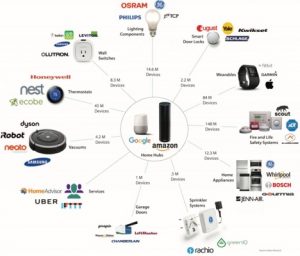Smart Home Devices help Amazon and Google to more invade your privacy
By Martin Jung | July 19, 2019
The number of smart speakers with voice assistant such as Amazon’s Echo and Google’s Home has been increased to 66.4 million at the beginning of 2019. The speakers keep track of the questions people ask and store recordings of them.
On top of that, the speakers integrate tightly with many smart home devices, allowing owners to communicate to those devices leveraging the speakers and provide instructions by voice commands, remote controls or a touchscreen. Short list of examples of such smart devices is light bulb made by Philips; ceiling fans made by Hunter Fan; thermostats made by Ecobee, and Nest; security door ring made by Ring; door locks made by August; and self-steering vacuums from iRobot. Recently, Amazon Alexa partnered with UK National Health Service to allow owners to ask health questions and Amazon Alexa answers the question based on searches of the NHS site. This enablement is opening up a new level of privacy concern, since Amazon now has a private health information of the owners.

Amazon’s privacy policy and Google’s privacy policy state that the information would be shared within the companies or to the subsidiary companies. This means that the data that can be collected include not only the voice recording but also maps of homes (vacuums) or everyday schedule of the owners (light bulb and thermostats) or health condition. Moreover, especially when paired with other information about you such as home address, calendar information, it helps fill out a complete record of your behavior and surrounding situations. In sum, this situation clearly expands Surveillance footprint and Secondary Use in terms of Solove’s Privacy Taxonomy.
Owners of Amazon Echo and Google Home can delete their recorded voice or opt out of some data collection. However, by default the information is stored and the process of deleting the record is somewhat complicated. For a government policy to mitigate this problem, the expansive General Data Protection Regulation (GDPR) in Europe, people have the right to ask companies to stop using or delete their private information. However, U.S. regulation generally does not give people that much control. A California Consumer Privacy Act set to take effect in 2020 will give the owners the right to know what data is being collected and shared and allow the owners to deny companies the right to sell it.
Regardless how strict the regulation is, data hungry companies such as Amazon and Google will try to work out of the regulation and will continue to find a way to collect owner’s data to drive their business by expanding their ecosystem devices. It is becoming more important for users to feel the urgency and configure the devices or speakers not to collect their private data as much as they want to enjoy the Smart Home devices.
